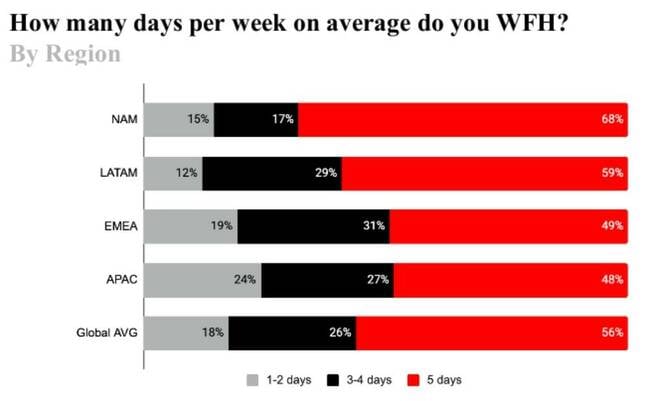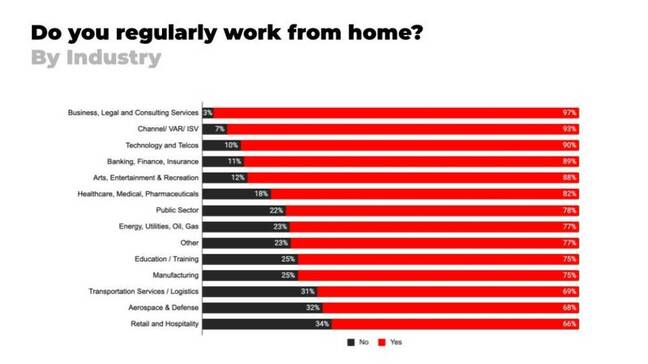When It Comes To Working From Home, Register Readers Are Bucking National Trends

Every week we run a reader survey at the bottom of articles and the results for last week's question on home working made for interesting reading.
More than 5,000 of you responded to the home working poll and the results show that around three-quarters of readers work at least part of the week at home – with staff in EMEA topping the rankings at 88 percent and North America trailing in last at 73 percent. By comparison, the latest figures from the OECD [PDF] show working from home is down to 29 percent in the US, behind Latin America and APAC.
For decades working from home was discussed yet seldom acted on. Only an estimated five percent of workers were doing so by the time the COVID-19 pandemic hit. With many countries going into lockdown, many organizations had little choice to enact work-from-home policies or furlough their businesses.
The move back to regular office life is taking a lot longer than some people forecast and it's clear Register readers prefer the lack of a commute in the morning, having a private bathroom and kitchen, and the more relaxed dress code that staying at home affords.
On average more than half (56 percent) of Register readers participating in the survey said they worked from home five days a week, and this rose to 68 percent in North America. Meanwhile in Europe and Asia fewer than half of staff are exclusively out of the office.
That said, the type of company you work from has a huge impact on this. In companies with fewer than 25 employees, 72 percent of staff worked from home full time. No other business size has more than half of the staff working without an office, at least among Register readers. But that isn't too surprising – if you're in a tiny business, why go to the expense of even having an office when you can invest the capital in other areas?
- Return to Office mandates boost company profits? Nope
- IBM Consulting is done playing around, orders immediate return to office
- 'Return to Office' declared dead
- To be, or not to be, in the office. Has returning to work stalled?
The figures also skew sharply based on the types of work you do. For example, only three percent of those describing themselves as being in business, legal and consulting services are in the office full time and 63 percent eschew offices altogether. Nine out of ten channel and technology industry staff were also out of the office 90 percent of the time.
As with any survey, however, the methodology is key and there is a practical skew on these figures. Register readers are much more likely to be technology adept enough to work from home, and have jobs that can be done remotely. A former IT manager worked exclusively outside the office even before the pandemic because he didn't need to go in, cheerfully describing himself as an introvert.
But there are whole swathes of industry where working from home just isn't possible. Unsurprisingly those in the retail, hospitality, and the defense industry had the lowest levels of remote working among those reading The Register.
Nevertheless, it's clear that working from home is definitely a preferred option for many, although not all. This hack is now in the office five days a week (journalism is a social trade after all) and there are others in the same boat. Plus there are ever-increasing signs that employers in larger tech firms are strongly encouraging more time in the office and making it clear that the road to advancement means turning up sometimes in person.
We'll return to this topic in later polls to see how this situation develops but in the meantime feel free to add your views to the latest research on The Register in the comments below. ®
From Chip War To Cloud War: The Next Frontier In Global Tech Competition
The global chip war, characterized by intense competition among nations and corporations for supremacy in semiconductor ... Read more
The High Stakes Of Tech Regulation: Security Risks And Market Dynamics
The influence of tech giants in the global economy continues to grow, raising crucial questions about how to balance sec... Read more
The Tyranny Of Instagram Interiors: Why It's Time To Break Free From Algorithm-Driven Aesthetics
Instagram has become a dominant force in shaping interior design trends, offering a seemingly endless stream of inspirat... Read more
The Data Crunch In AI: Strategies For Sustainability
Exploring solutions to the imminent exhaustion of internet data for AI training.As the artificial intelligence (AI) indu... Read more
Google Abandons Four-Year Effort To Remove Cookies From Chrome Browser
After four years of dedicated effort, Google has decided to abandon its plan to remove third-party cookies from its Chro... Read more
LinkedIn Embraces AI And Gamification To Drive User Engagement And Revenue
In an effort to tackle slowing revenue growth and enhance user engagement, LinkedIn is turning to artificial intelligenc... Read more



